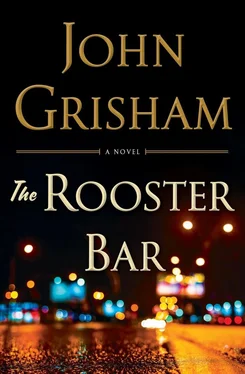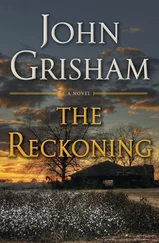John Grisham
The Rooster Bar
The end of the year brought the usual holiday festivities, though around the Frazier house there was little to cheer. Mrs. Frazier went through the motions of decorating a small tree and wrapping a few cheap gifts and baking cookies no one really wanted, and, as always, she kept The Nutcracker running nonstop on the stereo as she gamely hummed along in the kitchen as though the season was merry.
Things were anything but merry. Mr. Frazier had moved out three years earlier, and he wasn’t missed as much as he was despised. In no time, he had moved in with his young secretary, who, as things developed, was already pregnant. Mrs. Frazier, jilted, humiliated, broke, and depressed, was still struggling.
Louie, her younger son, was under house arrest, sort of free on bail, and facing a rough year ahead with the drug charges and all. He made no effort to buy his mom anything in the way of a gift. His excuse was that he couldn’t leave the house because of the court-ordered monitor attached to his ankle. But even without it, no one expected Louie to go to the trouble of buying gifts. The year before and the year before that both of his ankles had been unburdened and he hadn’t bothered to shop.
Mark, the older son, was home from the horrors of law school, and, though even poorer than his brother, had managed to buy his mother some perfume. He was scheduled to graduate in May, sit for the bar exam in July, and begin working with a D.C. firm in September, which, as it so happened, was the same month Louie’s trial was on the docket. But Louie’s case would not go to trial for two very good reasons. First, the undercover boys had caught him in the act of selling ten bags of crack — there was even a video — and, second, neither Louie nor his mother could afford a decent lawyer to handle the mess. Throughout the holidays, both Louie and Mrs. Frazier dropped hints that Mark should rush in and volunteer to defend his brother. Wouldn’t it be easy to stall matters until later in the year when Mark was properly admitted to the bar — he was practically there anyway — and once he had his license wouldn’t it be a simple matter of finding one of those technicalities you read about to get the charges dismissed?
This little fantasy of theirs had some rather large holes in it, but Mark refused to discuss it. When it became apparent that Louie planned to hog the sofa for at least ten hours on New Year’s Day and watch seven straight bowl games, Mark made a quiet exit and went to a friend’s house. Returning home that night, while driving under the influence, he made the decision to flee. He would return to D.C. and kill some time puttering around the law firm where he would soon be employed. Classes didn’t start for almost two weeks, but after ten days of listening to Louie bitch and moan about his problems, not to mention the nonstop Nutcracker, Mark was fed up and looking forward to his last semester of law school.
He set his alarm for eight the following morning, and over coffee with his mom explained that he was needed back in D.C. Sorry to leave a bit earlier than expected, Mom, and sorry to leave you here all alone with your bad boy, Mom, but I’m outta here. He’s not mine to raise. I got my own problems.
The first problem was his vehicle, a Ford Bronco he’d been driving since high school. The odometer had frozen at 187,000 miles, and that had happened midway through college. It desperately needed a new fuel pump, one of many replacement parts on the Urgent List. Using tape and paper clips, Mark had been able to wire and jerry-rig the engine, transmission, and brakes for the past two years, but he’d had no luck with the fuel pump. It worked but at a lower capacity than normal, so that the Bronco’s max speed was forty-nine on level ground. To avoid being clobbered by 18-wheelers on the expressways, Mark stuck to the back roads of rural Delaware and the Eastern Shore. The two-hour drive from Dover to central D.C. took twice as long.
This gave him even more time to consider his other problems. Number two was his suffocating student debt. He’d finished college with $60,000 in loans, and no job. His father, who seemed happily married at the time but was also in debt, had warned him against further studies. He’d said, “Hell, boy, four years of education and you’re sixty grand in the hole. Quit before it gets any worse.” But Mark thought taking any financial advice from his father was foolish, so he worked a couple of years here and there, bartending and delivering pizza, while he haggled with his lenders. Now, looking back, he wasn’t sure where the idea of law school had originated, but he did remember overhearing a conversation between two frat brothers who were pondering weighty matters while drinking heavily. Mark was the bartender, the lounge was not crowded, and after the fourth round of vodka and cranberry juice they talked loud enough for all to hear. Among many interesting things they had said, Mark had always remembered two: “The big D.C. law firms are hiring like crazy.” And, “Starting salaries are one-fifty a year.”
Not long after that, he bumped into a college friend who was a first-year student at the Foggy Bottom Law School in D.C., and the guy gushed on about his plans to blitz through his studies, finish in two and a half years, and sign on with a big firm for a fat salary. The Feds were throwing loans at students, anybody could qualify, and, well sure, he would graduate with a mountain of debt but nothing he couldn’t wipe out in five years. To his friend, at least, it made perfect sense to “invest in himself” with the debt because it would guarantee all that future earning power.
Mark took the bait and began studying for the Law School Admission Test. His score was an unimpressive 146, but this did not bother the admissions folks at the Foggy Bottom Law School. Nor did his rather thin undergraduate résumé with an anemic grade point average of 2.8. FBLS accepted him with open arms. His loan applications were quickly approved. Sixty-five thousand bucks were simply transferred from the Department of Education each year to Foggy Bottom. And now, with one semester to go, Mark was staring miserably at the reality of graduating with a combined total, undergrad and law school, principal and interest, of $266,000 in debt.
Another problem was his job. As it happened, the market wasn’t quite as strong as rumored. Nor was it as vibrant as FBLS had advertised in its slick brochures and near-fraudulent website. Graduates from top-tier law schools were still finding work at enviable salaries. FBLS, though, was not quite in the top tier. Mark had managed to worm his way into a midsized law firm that specialized in “governmental relations,” which meant nothing more than lobbying. His starting salary had not been established, because the firm’s management committee would meet in early January to review profits from the previous year and supposedly jiggle the pay structure. In a few months, Mark would be expected to have an important talk with his “loan counselor” about restructuring his student debt and somehow repaying the entire mess. This counselor had already expressed concern that Mark did not know how much he would be earning. This concerned Mark too, especially when added to the fact that he didn’t trust a single person he’d met at the law firm. As much as he tried to fool himself, he knew deep in his gut that his position was not secure.
Another problem was the bar exam. Because of demand, the D.C. version of the test was one of the more challenging in the nation, and FBLS grads had been bombing it at an alarming rate. Again, the top schools in town did well. The year before, Georgetown had a 91 percent pass rate. For George Washington it was 89 percent. For FBLS, the pass rate was a pathetic 56 percent. To succeed, Mark needed to start studying now, in early January, and hit the books nonstop for six months.
Читать дальше












